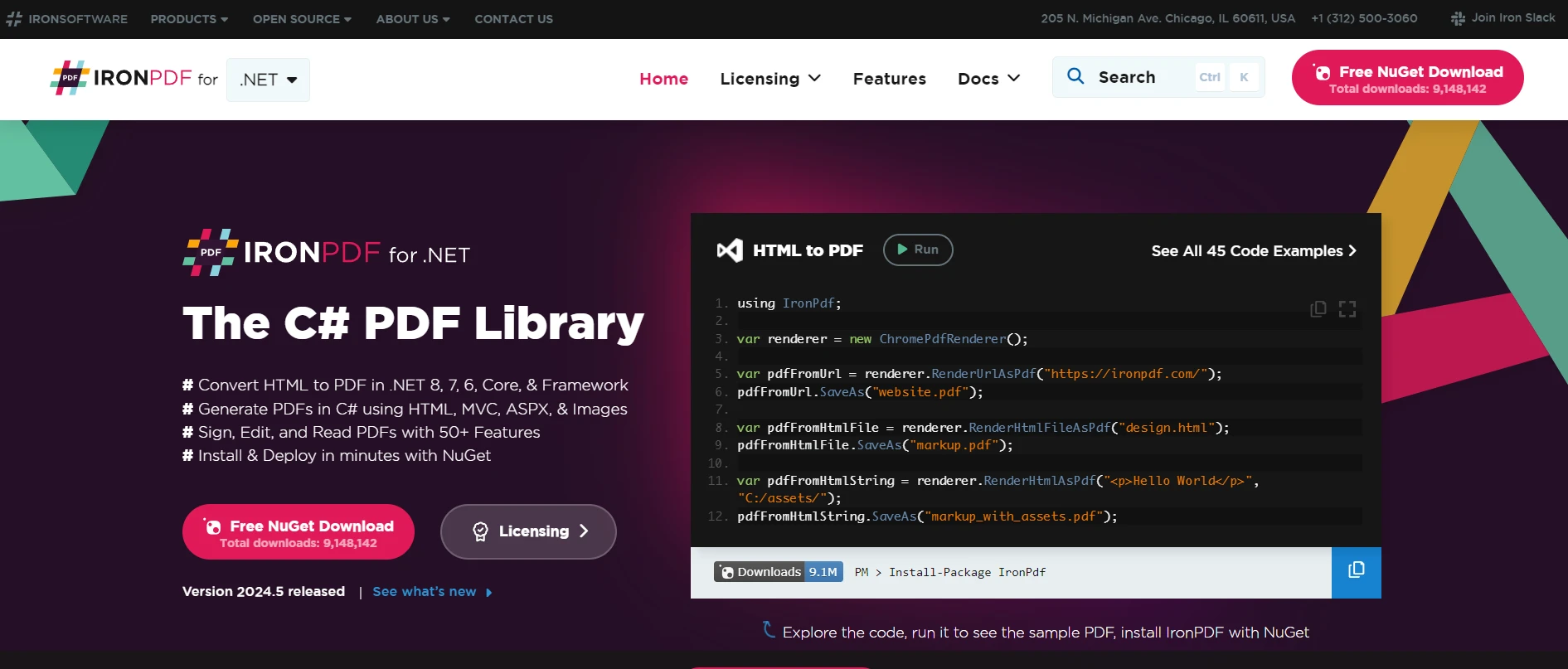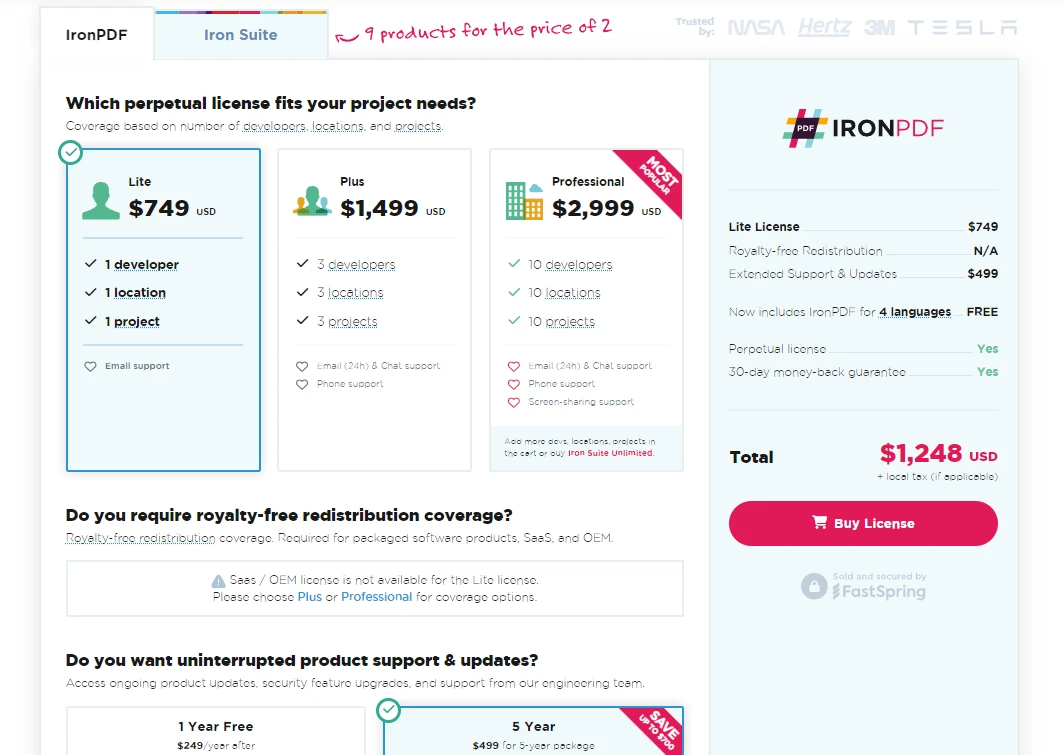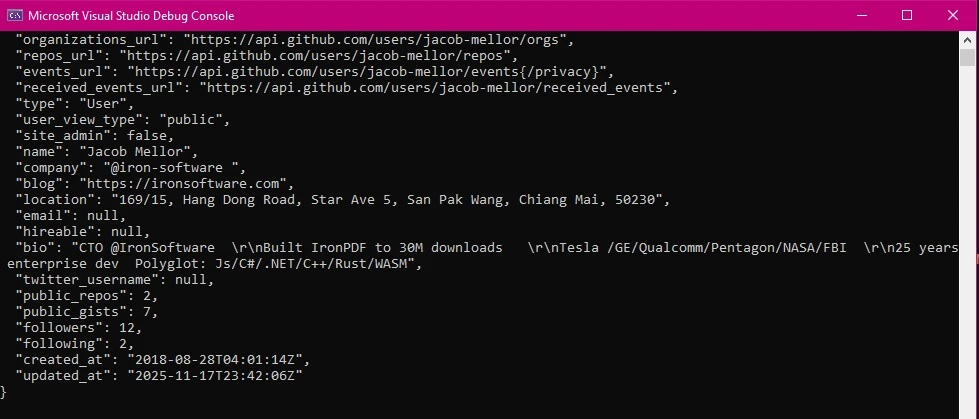Octokit .NET (How It Works For Developers)
Getting Started with Octokit.NET
Setting Up Octokit.NET in .NET Projects
To begin using Octokit.NET in your projects, you first need to install the package. You can add it via NuGet, which is the easiest method. In Visual Studio, you can use the NuGet Package Manager. Search for Octokit and install it in your project.
A Basic Code Example: Accessing GitHub User Information
Here is a simple example of how to use Octokit.NET to retrieve information about a GitHub user. This example assumes you have already set up your project with Octokit.NET.
using Octokit;
using System;
using System.Threading.Tasks;
class Program
{
static async Task Main(string[] args)
{
// Create a new instance of the GitHubClient class with your application name
var client = new GitHubClient(new ProductHeaderValue("YourAppName"));
// Retrieve user information for the specified GitHub username
var user = await client.User.Get("octocat");
// Output the user's name to the console
Console.WriteLine("User Name: " + user.Name);
}
}using Octokit;
using System;
using System.Threading.Tasks;
class Program
{
static async Task Main(string[] args)
{
// Create a new instance of the GitHubClient class with your application name
var client = new GitHubClient(new ProductHeaderValue("YourAppName"));
// Retrieve user information for the specified GitHub username
var user = await client.User.Get("octocat");
// Output the user's name to the console
Console.WriteLine("User Name: " + user.Name);
}
}Imports Octokit
Imports System
Imports System.Threading.Tasks
Friend Class Program
Shared Async Function Main(ByVal args() As String) As Task
' Create a new instance of the GitHubClient class with your application name
Dim client = New GitHubClient(New ProductHeaderValue("YourAppName"))
' Retrieve user information for the specified GitHub username
Dim user = Await client.User.Get("octocat")
' Output the user's name to the console
Console.WriteLine("User Name: " & user.Name)
End Function
End ClassThis code snippet creates a new GitHub client and retrieves information for a specific user, octocat. It then prints the user's name to the console. Note that this demonstrates access to GitHub’s API without authentication for public user information.
Implement Features of Octokit.NET
Searching Repositories
You can search GitHub repositories by criteria using Octokit.NET. Here's how to perform a search:
using Octokit;
using System;
using System.Threading.Tasks;
class Program
{
static async Task Main(string[] args)
{
var client = new GitHubClient(new ProductHeaderValue("YourAppName"));
// Define search criteria: topic 'machine learning' and language 'C#'
var searchRepositoriesRequest = new SearchRepositoriesRequest("machine learning")
{
Language = Language.CSharp
};
// Execute the search and retrieve the results
var result = await client.Search.SearchRepo(searchRepositoriesRequest);
// Iterate and print each repository's full name
foreach (var repo in result.Items)
{
Console.WriteLine(repo.FullName);
}
}
}using Octokit;
using System;
using System.Threading.Tasks;
class Program
{
static async Task Main(string[] args)
{
var client = new GitHubClient(new ProductHeaderValue("YourAppName"));
// Define search criteria: topic 'machine learning' and language 'C#'
var searchRepositoriesRequest = new SearchRepositoriesRequest("machine learning")
{
Language = Language.CSharp
};
// Execute the search and retrieve the results
var result = await client.Search.SearchRepo(searchRepositoriesRequest);
// Iterate and print each repository's full name
foreach (var repo in result.Items)
{
Console.WriteLine(repo.FullName);
}
}
}Imports Octokit
Imports System
Imports System.Threading.Tasks
Friend Class Program
Shared Async Function Main(ByVal args() As String) As Task
Dim client = New GitHubClient(New ProductHeaderValue("YourAppName"))
' Define search criteria: topic 'machine learning' and language 'C#'
Dim searchRepositoriesRequest As New SearchRepositoriesRequest("machine learning") With {.Language = Language.CSharp}
' Execute the search and retrieve the results
Dim result = Await client.Search.SearchRepo(searchRepositoriesRequest)
' Iterate and print each repository's full name
For Each repo In result.Items
Console.WriteLine(repo.FullName)
Next repo
End Function
End ClassThis code searches for repositories related to "machine learning" written in C#. It outputs the full names of the repositories.
Managing Forked Repositories
To manage forked repositories, you can list and create forks. Here's how to list the forks of a repository:
using Octokit;
using System;
using System.Threading.Tasks;
class Program
{
static async Task Main(string[] args)
{
var client = new GitHubClient(new ProductHeaderValue("YourAppName"));
// List all forks for the 'Hello-World' repository owned by 'octocat'
var forks = await client.Repository.Forks.GetAll("octocat", "Hello-World");
// Print each fork's ID and owner login
foreach (var fork in forks)
{
Console.WriteLine("Fork ID: " + fork.Id + " - Owner: " + fork.Owner.Login);
}
}
}using Octokit;
using System;
using System.Threading.Tasks;
class Program
{
static async Task Main(string[] args)
{
var client = new GitHubClient(new ProductHeaderValue("YourAppName"));
// List all forks for the 'Hello-World' repository owned by 'octocat'
var forks = await client.Repository.Forks.GetAll("octocat", "Hello-World");
// Print each fork's ID and owner login
foreach (var fork in forks)
{
Console.WriteLine("Fork ID: " + fork.Id + " - Owner: " + fork.Owner.Login);
}
}
}Imports Octokit
Imports System
Imports System.Threading.Tasks
Friend Class Program
Shared Async Function Main(ByVal args() As String) As Task
Dim client = New GitHubClient(New ProductHeaderValue("YourAppName"))
' List all forks for the 'Hello-World' repository owned by 'octocat'
Dim forks = Await client.Repository.Forks.GetAll("octocat", "Hello-World")
' Print each fork's ID and owner login
For Each fork In forks
Console.WriteLine("Fork ID: " & fork.Id & " - Owner: " & fork.Owner.Login)
Next fork
End Function
End ClassThis example lists all forks of the "Hello-World" repository owned by octocat.
Handling Rate Limits
Understanding and handling rate limits is crucial when interacting with the GitHub API. Octokit.NET provides tools to check your rate limits:
using Octokit;
using System;
using System.Threading.Tasks;
class Program
{
static async Task Main(string[] args)
{
var client = new GitHubClient(new ProductHeaderValue("YourAppName"));
// Retrieve the current rate limits for your GitHub API usage
var rateLimit = await client.Miscellaneous.GetRateLimits();
// Display the core API usage limit information
Console.WriteLine("Core Limit: " + rateLimit.Resources.Core.Limit);
}
}using Octokit;
using System;
using System.Threading.Tasks;
class Program
{
static async Task Main(string[] args)
{
var client = new GitHubClient(new ProductHeaderValue("YourAppName"));
// Retrieve the current rate limits for your GitHub API usage
var rateLimit = await client.Miscellaneous.GetRateLimits();
// Display the core API usage limit information
Console.WriteLine("Core Limit: " + rateLimit.Resources.Core.Limit);
}
}Imports Octokit
Imports System
Imports System.Threading.Tasks
Friend Class Program
Shared Async Function Main(ByVal args() As String) As Task
Dim client = New GitHubClient(New ProductHeaderValue("YourAppName"))
' Retrieve the current rate limits for your GitHub API usage
Dim rateLimit = Await client.Miscellaneous.GetRateLimits()
' Display the core API usage limit information
Console.WriteLine("Core Limit: " & rateLimit.Resources.Core.Limit)
End Function
End ClassThis snippet checks and displays the core limit of your GitHub API usage, helping you manage requests without exceeding rate limits.
Reactive Extensions Support
Octokit.NET supports Reactive Extensions (Rx) for reactive programming. Here's a basic example:
using Octokit.Reactive;
using System;
class ReactiveExample
{
static void Main(string[] args)
{
var client = new ObservableGitHubClient(new ProductHeaderValue("YourAppName"));
// Subscribe to retrieve user information and handle data/error reactively
var subscription = client.User.Get("octocat").Subscribe(
user => Console.WriteLine("User Name: " + user.Name),
error => Console.WriteLine("Error: " + error.Message)
);
// Unsubscribe when done to avoid memory leaks
subscription.Dispose();
}
}using Octokit.Reactive;
using System;
class ReactiveExample
{
static void Main(string[] args)
{
var client = new ObservableGitHubClient(new ProductHeaderValue("YourAppName"));
// Subscribe to retrieve user information and handle data/error reactively
var subscription = client.User.Get("octocat").Subscribe(
user => Console.WriteLine("User Name: " + user.Name),
error => Console.WriteLine("Error: " + error.Message)
);
// Unsubscribe when done to avoid memory leaks
subscription.Dispose();
}
}Imports Octokit.Reactive
Imports System
Friend Class ReactiveExample
Shared Sub Main(ByVal args() As String)
Dim client = New ObservableGitHubClient(New ProductHeaderValue("YourAppName"))
' Subscribe to retrieve user information and handle data/error reactively
Dim subscription = client.User.Get("octocat").Subscribe(Sub(user) Console.WriteLine("User Name: " & user.Name), Sub([error]) Console.WriteLine("Error: " & [error].Message))
' Unsubscribe when done to avoid memory leaks
subscription.Dispose()
End Sub
End ClassThis example demonstrates how to asynchronously retrieve user information and handle it reactively.
Working with Tags
To work with Git tags through Octokit.NET, you can retrieve tags from a repository:
using Octokit;
using System;
using System.Threading.Tasks;
class Program
{
static async Task Main(string[] args)
{
var client = new GitHubClient(new ProductHeaderValue("YourAppName"));
// Retrieve all tags for the 'Hello-World' repository owned by 'octocat'
var tags = await client.Repository.GetAllTags("octocat", "Hello-World");
// Print each tag's name
foreach (var tag in tags)
{
Console.WriteLine("Tag Name: " + tag.Name);
}
}
}using Octokit;
using System;
using System.Threading.Tasks;
class Program
{
static async Task Main(string[] args)
{
var client = new GitHubClient(new ProductHeaderValue("YourAppName"));
// Retrieve all tags for the 'Hello-World' repository owned by 'octocat'
var tags = await client.Repository.GetAllTags("octocat", "Hello-World");
// Print each tag's name
foreach (var tag in tags)
{
Console.WriteLine("Tag Name: " + tag.Name);
}
}
}Imports Octokit
Imports System
Imports System.Threading.Tasks
Friend Class Program
Shared Async Function Main(ByVal args() As String) As Task
Dim client = New GitHubClient(New ProductHeaderValue("YourAppName"))
' Retrieve all tags for the 'Hello-World' repository owned by 'octocat'
Dim tags = Await client.Repository.GetAllTags("octocat", "Hello-World")
' Print each tag's name
For Each tag In tags
Console.WriteLine("Tag Name: " & tag.Name)
Next tag
End Function
End ClassThis code lists all tags for the "Hello-World" repository owned by octocat.
Integrating Octokit.NET with IronPDF

IronPDF is a popular .NET library that allows developers to create, manipulate, and render PDFs directly within C# and .NET applications. It's a powerful tool for generating PDF reports from HTML, invoices, or any document that needs a fixed layout format. When combined with Octokit.NET, which interacts with GitHub's API, the potential for automating documentation processes, especially involving code repositories, increases significantly.
Explore IronPDF Library
To learn more about IronPDF and its functionalities, please visit the IronPDF Official Website. Their site provides comprehensive resources and documentation to support your development process.
Use Case of Merging IronPDF with Octokit.NET
One practical use case for integrating IronPDF with Octokit.NET is automatically generating a PDF report of a project's documentation stored in a GitHub repository. For instance, you could fetch all markdown files from a specific repository, convert them into a PDF document, and then distribute this document among stakeholders or customers who might prefer a compiled version of documentation or release notes.
Code Example of Use Case
Let's create a simple application that demonstrates this integration. The application will perform the following tasks:
- Authenticate and connect to GitHub using Octokit.NET.
- Fetch files from a specified repository.
- Convert these files from Markdown to PDF using IronPDF.
- Save the PDF to the local machine.
Here's how you might write this in C#:
using Octokit;
using IronPdf;
using System;
using System.Threading.Tasks;
using System.Linq;
class Program
{
static async Task Main(string[] args)
{
// GitHub client setup
var client = new GitHubClient(new ProductHeaderValue("YourAppName"));
var tokenAuth = new Credentials("your_github_token"); // Replace with your GitHub token
client.Credentials = tokenAuth;
// Repository details
var owner = "repository_owner";
var repo = "repository_name";
// Fetch repository content
var contents = await client.Repository.Content.GetAllContents(owner, repo);
// Initialize the PDF builder
var pdf = new ChromePdfRenderer();
// Convert each markdown file to PDF
foreach (var content in contents.Where(c => c.Name.EndsWith(".md")))
{
pdf.RenderHtmlAsPdf(content.Content).SaveAs($"{content.Name}.pdf");
Console.WriteLine($"Created PDF for: {content.Name}");
}
}
}using Octokit;
using IronPdf;
using System;
using System.Threading.Tasks;
using System.Linq;
class Program
{
static async Task Main(string[] args)
{
// GitHub client setup
var client = new GitHubClient(new ProductHeaderValue("YourAppName"));
var tokenAuth = new Credentials("your_github_token"); // Replace with your GitHub token
client.Credentials = tokenAuth;
// Repository details
var owner = "repository_owner";
var repo = "repository_name";
// Fetch repository content
var contents = await client.Repository.Content.GetAllContents(owner, repo);
// Initialize the PDF builder
var pdf = new ChromePdfRenderer();
// Convert each markdown file to PDF
foreach (var content in contents.Where(c => c.Name.EndsWith(".md")))
{
pdf.RenderHtmlAsPdf(content.Content).SaveAs($"{content.Name}.pdf");
Console.WriteLine($"Created PDF for: {content.Name}");
}
}
}Imports Octokit
Imports IronPdf
Imports System
Imports System.Threading.Tasks
Imports System.Linq
Friend Class Program
Shared Async Function Main(ByVal args() As String) As Task
' GitHub client setup
Dim client = New GitHubClient(New ProductHeaderValue("YourAppName"))
Dim tokenAuth = New Credentials("your_github_token") ' Replace with your GitHub token
client.Credentials = tokenAuth
' Repository details
Dim owner = "repository_owner"
Dim repo = "repository_name"
' Fetch repository content
Dim contents = Await client.Repository.Content.GetAllContents(owner, repo)
' Initialize the PDF builder
Dim pdf = New ChromePdfRenderer()
' Convert each markdown file to PDF
For Each content In contents.Where(Function(c) c.Name.EndsWith(".md"))
pdf.RenderHtmlAsPdf(content.Content).SaveAs($"{content.Name}.pdf")
Console.WriteLine($"Created PDF for: {content.Name}")
Next content
End Function
End ClassIn this example, after setting up the GitHub client and specifying your credentials, you fetch content from a repository. For each markdown file in the repository, IronPDF converts the content to a PDF file, which is then saved locally. This simple yet effective workflow can be expanded to include more complex filtering, formatting, or even batch processing of files for larger repositories.
Conclusion

Integrating Octokit.NET with IronPDF offers a seamless approach to automating and streamlining document workflows within your GitHub projects. By leveraging these tools, you can enhance the efficiency of handling documentation, making it easily accessible in formats that meet various professional needs. IronPDF, in particular, provides a robust platform for PDF manipulation, and it's worth noting that they offer free trials to get you started. Should you decide to implement it in your project, licensing starts from $799.
For more information about Iron Software's product offerings, including IronPDF and other libraries like IronBarcode, IronOCR, IronWebScraper, and more, visit the Iron Software Product Libraries.
Frequently Asked Questions
How can I integrate Octokit.NET with PDF generation tools?
You can integrate Octokit.NET with libraries like IronPDF to automate the generation of PDF reports from GitHub repository content. By using Octokit.NET to fetch markdown files and IronPDF to convert them to PDFs, you can streamline documentation workflows.
What are the steps to convert GitHub markdown files into PDFs using .NET?
First, use Octokit.NET to access the markdown files from your GitHub repository. Then, employ IronPDF's ChromePdfRenderer to convert these markdown files into PDF format, allowing for easy distribution and archiving.
Is it possible to automate documentation workflows with Octokit.NET?
Yes, by combining Octokit.NET with IronPDF, you can automate the process of fetching content from GitHub repositories and converting it into PDF documents, thus enhancing the efficiency of documentation workflows.
How do I fetch repository content using Octokit.NET?
To fetch repository content with Octokit.NET, initialize a GitHubClient and use methods like Repository.GetAllContents to retrieve files or directories from a specified repository.
What benefits do PDF reports provide for GitHub documentation?
Generating PDF reports from GitHub documentation ensures that the content is easily distributable and accessible offline. Tools like IronPDF facilitate this process, creating professional and consistently formatted documents.
How can rate limits affect my use of Octokit.NET?
Octokit.NET includes methods to monitor API rate limits, such as Miscellaneous.GetRateLimits. This helps you manage API requests effectively, preventing interruptions caused by exceeding rate limits.
Why use Reactive Extensions with Octokit.NET?
Reactive Extensions in Octokit.NET allow you to manage asynchronous data streams efficiently, providing a reactive approach to handling data and errors, which is beneficial for applications requiring robust data handling.





















